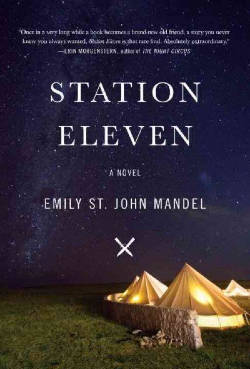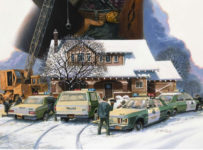
You may have noticed that there are things happening in the real world, hopefully outside your window, and that you will never have to venture outside again. Station Eleven is (was?) due to become an HBO series starring Mackenzie Davis and Himesh Patel this year, so it was already on a reread list.
This particular reading of Emily St. John Mandel's Station Eleven commenced after things had kicked off globally and ended the day before "shit got realâ€, as Danny Butterman has been known to say. Station Eleven is a novel about a global pandemic, for certain, but it has something that the real global pandemic of 2020 currently lacks: hope for humanity.
Station Eleven splits timelines in the most satisfactory way: it begins with an actor dying of a heart attack on a Canadian stage, a precursor to North America being largely wiped out by the "Georgian fluâ€. The book cuts across time between people tangentially related to the actor, among them the paramedic who could not save the actor in the days immediately following the outbreak; the actor's first wife in their far distant shared past; and a child who was in the actor's production of King Lear, twenty years removed from civilisation as it used to be recognised.
Station Eleven does not concern itself at all with political reaction or mobilisation, perhaps largely because the Georgian flu is so fast moving that it decimates everyone but the immune in less than 24 hours; infrastructure is understandably compromised irreparably almost immediately. The tangential approach to focal characters creates a fascinating spider web that stretches across decades and not only enables but actively encourages coincidences.
Station Eleven is a largely superlative novel, and inevitably it must draw comparison with the pantheon of post-apocalyptica. It begins to address one of the main roadblocks that Stephen King had in the construction of The Stand: why, if society disappeared, would people be so keen to rebuild it exactly as it was? Station Eleven's presentation of a United States consisting of small townships connected by trading caravans and a Traveling Symphony is a fascinating glimpse into what could come after the first ten years of mayhem and havoc: pockets of civil society, and cults. A lot of cults.
It makes one wonder why, in the face of global collapse, status quo has to be maintained. Why should people have to immediately go back to work to become just more blood oiling the wheels of capital? Why long for something that only ever worked for the most comfortable at the expense of others? There's no real "us†and "them†in Station Eleven as the Georgian flu is legitimately the great equaliser, but the new world that is born from the ashes is one that, if difficult, at least has pretensions to egalitarianism.
Station Eleven is about the nature of memory, the endurance of storytelling, and the need for people to derive meaning from their surroundings. Nothing is arbitrary, and Mandel has pulled off a feat by juggling multiple timelines — including a later, parallel part of the novel that spans events previously covered from a different angle up to a different part of the post Year Zero — and slotting them together in a logical fashion that is never confusing. It's a modular novel in the best way, with each section complementing that which comes before and after it. There's a distinct vibe to Mandel's prose that brings her empty world to life; there are few questions left to be asked by the reader, not because Mandel is overly fond of exposition but because Year Twenty breathes even when the covers of the book are closed.
If there are issues with Station Eleven, it's that the mystery driving the Year Twenty plot line wraps itself rather abruptly, its meaning only intuited by a reader rather than the characters who endure it; the other is that the titular Station Eleven exists within the text as a vanity published comic book that is shadowy at best — to bring it to the screen would be to illustrate and illuminate it, and perhaps it could not live up to whatever the mind's eye can picture.
As is the case with much genre work written by hitherto fore literary authors, Station Eleven is compact. It could conceivably have gone on forever, but Mandel ultimately presents a bite sized feast. With much to consider about the human nature and where self-interest intersects with community mindedness, Station Eleven is a beacon on a dark horizon. It is easy to say, when you're reading a book, that almost everyone is going to die but ultimately things will be all right. It's cold comfort, but Station Eleven might be the boost needed to deal with … whatever the hell 2020 is.


